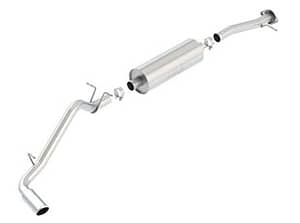This question is often asked ” will this void my factory warranty ” NO. It’s also illegal for a dealer to deny you the OE warranty because you have changed the exhaust system. This is an often asked question. But you will need to be armed with some basic information.
Under the Magnuson Moss Warranty Act of 1975, 15 USC, 2302 and Clean Air Act 42 of USA code 7541, you have rights.
This legislation basically states that:
In order for a dealer/manufacturer to deny a warranty on a claimed part. They must PROVE that the part YOU installed/had installed DIRECTLY caused the failure of the part on which you’re claiming the warranty.
What does this mean to you?
Let’s say you install a turbocharger to the engine. Will this void my factory warranty ? Could this void the transmission warranty? The axle warranty? The answer is “possibly,” as the increased stress to these components cause by the increased power output from the turbo could indeed cause your warranty to be denied.
What about a cat back exhaust system? Will this void my factory warranty?

Since most high quality systems, at least those systems that are 50 state legal, are installed behind the catalytic converters. There should be no warranty concerns to other components, even emissions components. Most exhaust companies, including FMS Performance, design their systems so that no modification is necessary to get the systems to fit. They will not trigger “check engine” lights unless there’s a leak in the system which almost always caused by an oversight during installation and they will not effect emissions. Remember: the engine creates the emissions, the exhaust system is the path from which they exit. A freer flowing exhaust will not do anything to inhibit emissions expulsion or to increase emissions output, all of which is controlled by engine management and the catalytic converter(s).
Any properly engineered exhaust system
will not cause any failures of any other parts of the engine, suspension, chassis, transmission, electrical system, etc.
Of course, there’s a great deal to be said for the importance of having a qualified installer work on your vehicle. While FMS goes to great lengths to provide ample clearance of fuel lines, electric lines, brake lines, etc., like any part you’d install, if care is not exercised, there could be interference with equipment on the vehicle. That’s why we recommend using a FMS “Preferred” dealer to do your installation, unless you have at least some basic knowledge of working on vehicles.
In any case, the most important thing you need to know
is that you need to be armed with this information. In many cases, dealers are just plain timid in doing repair work on vehicles that are even remotely different. What to do if denied a warranty?
You MUST get the denial in writing and demand that they are very specific in why they’re denying the claim and in providing solid evidentiary proof in how the part you installed/had installed caused the failure for which they’re denying the warranty.
Next, contact the Regional Service Manager
and of course, the manufacturer of your vehicle, mention the Magnuson Moss Warranty Act and document every word they say and retain copies of all paperwork. The problem is usually corrected here, as manufacturers know the law, dealers are just being cautions. Of course, some dealers are better than others and we’ve all had bad experiences. Use the internet chat rooms to seek out owners of similar vehicles to share their dealer experiences…its’ a powerful tool.
In most cases, when they realize that you’ve done you’re homework, the dealer and manufacturer will realize that they’re obligated to comply with the law.
For more information visit the SEMA website www.sema.org. SEMA is a trade organization of the automotive aftermarket, which has been active in protecting consumer rights.
Additional Info:

